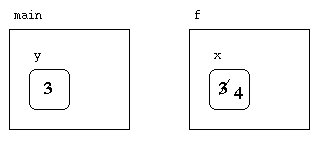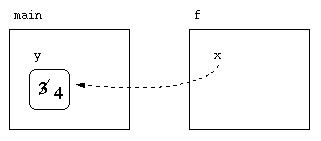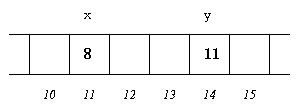

|
CMPT 212
Fall 1997
|
void f(int x) {
x = 4;
return;
}
int main() {
int y = 3;
f(y);
return 0;
}

void f(int& x) {
x = 4;
return;
}
int main() {
int y = 3;
f(y);
return 0;
}

const float pi = 3.0;
pi = 3.14159; // causes a compiling error.
void f(const int x) {
x = 7; // error.
}
void g(const bigStruct& w) {
w = ...; // error.
}
In function g, w is passed by reference
for efficiency, but is defined with const to
guarantee that w will not be changed in g.
int x = 8;
int * y;
y = &x;
cout << x; // outputs 8.
cout << y; // outputs 11.
cout << &x; // outputs 11.
cout << &y; // outputs 14.
cout << &(&x); // error: &x has no address.
cout << &(&y); // error: &y has no address.

int * y; // y is a pointer to an int.
int w;
w = *y; // *y is the int that y points to.
int x;
int * y;
y = &x;
*y = 3; // x also becomes 3.
cout << x; // outputs 3.
x = 4;
cout << (*y); // outputs 4.

Return to lecture notes index |
|
| This page is maintained by simpson@cs.sfu.ca. | Last updated on 22 Sep 1997. |